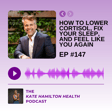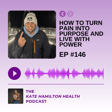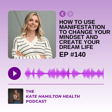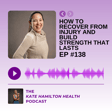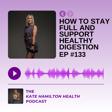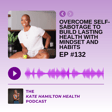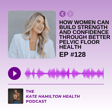
#121: Improve your sleep for health, fitness, and fat loss
Are you struggling to hit your health or fitness goals despite doing “all the right things”? In this solo episode of the Kate Hamilton Health Podcast, I chat about the powerful role that sleep plays in transforming your health, boosting fitness, and supporting fat loss - often more than diet or exercise alone!
I talk about how sleep impacts everything from hunger hormones and stress levels to daily decision-making and emotional resilience. You’ll learn why optimizing your sleep isn’t just a “nice to have” - it’s a non-negotiable for long-term wellness. Plus, I share simple, practical strategies to help you build a consistent, healthy sleep routine - even when life gets busy. Whether you're tired of feeling tired or curious about sleep's hidden impact on your progress, this episode is your wake-up call!
EPISODE HIGHLIGHTS:
[0:00] - Kicking off the episode and why this topic matters
[0:24] - How sleep influences your health, fitness, and fat loss journey
[1:37] - The link between sleep deprivation, hunger hormones, and poor choices
[2:28] - Practical tips to create a more restful nighttime routine
[3:42] - Why regular movement supports deeper, better sleep
[4:40] - How sleep helps manage mood swings and reduce stress
[5:11] - The long-term benefits of consistently good sleep
[7:07] - Navigating real-life sleep challenges with grace
[9:14] - The power of setting a consistent bedtime and wake time
[15:57] - Common disruptors to avoid for deeper sleep
[18:08] - A final word of encouragement to start small and stay consistent
Links & Resources:
If you enjoyed this episode, please subscribe, leave a review, and share it with friends who might benefit. For more health and fitness tips, follow me on Instagram and TikTok @katehamiltonhealth.
Music b LiQWYD Free download: hypeddit.com/link/xxtopb [http://hypeddit.com/link/xxtopb] Promoted by FreeMusicPromo [https://www.youtube.com/channel/UCbycji-eySnM3WD8mbxPUSQ] / @freemusicpromo
